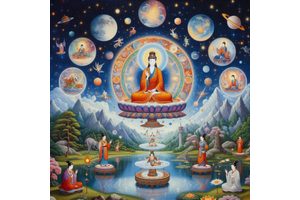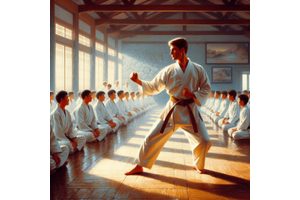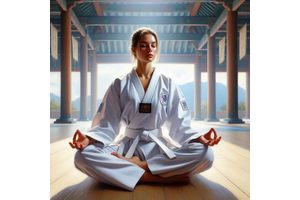Chon-Ji in Everyday Life
How the First Taekwondo Pattern Can Improve Your Well-Being
Chon-Ji, the first Taekwondo pattern, is not only a foundation for our martial arts journey, but also a guide for our daily lives. Chon-Ji means “Heaven” and “Earth”, and it symbolizes the balance we seek in both life and combat. In this blog post, we’ll explore how Chon-Ji can improve our well-being in various aspects of our lives, such as work, relationships, and self-care.
1. Work: Balance Your Professional and Personal Pursuits
Chon-Ji teaches us to balance heaven and earth, or our aspirations and our grounded reality. This can help us to achieve a healthy work-life balance, which is essential for our productivity, happiness, and health. Here are some tips to apply Chon-Ji’s balance to your work:
- Set realistic and attainable goals: Like earth, be practical and pragmatic. Don’t overestimate or underestimate your abilities and resources. Set SMART goals (Specific, Measurable, Achievable, Relevant, and Time-bound) that align with your values and vision.
- Pursue your passion and growth: Like heaven, be aspirational and ambitious. Don’t settle for mediocrity or stagnation. Pursue your passion and growth, whether it’s learning new skills, taking on new challenges, or seeking new opportunities.
- Manage your time and energy: Like Chon-Ji’s movements, be efficient and effective. Don’t waste your time and energy on trivial or unimportant tasks. Manage your time and energy, whether it’s prioritizing your tasks, delegating your work, or taking breaks.
- Enjoy your work and reward yourself: Like Chon-Ji’s spirit, be joyful and proud. Don’t dread your work or neglect your achievements. Enjoy your work and reward yourself, whether it’s celebrating your successes, expressing your gratitude, or indulging in your hobbies.
2. Relationships: Balance Your Communication and Connection
Chon-Ji teaches us to balance heaven and earth, or our aspirations and our grounded reality. This can help us to build healthy and harmonious relationships, which are essential for our social and emotional well-being. Here are some tips to apply Chon-Ji’s balance to your relationships:
- Listen and speak: Like Chon-Ji’s blocks and punches, be receptive and expressive. Don’t dominate or ignore the conversation. Listen and speak, whether it’s showing interest, asking questions, or sharing opinions.
- Give and receive: Like Chon-Ji’s yin and yang, be generous and grateful. Don’t take or give more than you can. Give and receive, whether it’s offering help, accepting support, or expressing appreciation.
- Respect and trust: Like Chon-Ji’s etiquette and discipline, be respectful and trustworthy. Don’t violate or doubt the boundaries and expectations. Respect and trust, whether it’s being honest, loyal, or reliable.
- Have fun and grow: Like Chon-Ji’s joy and pride, be playful and adventurous. Don’t bore or limit yourself or your partner. Have fun and grow, whether it’s trying new things, exploring new places, or learning new things.
3. Self-Care: Balance Your Physical, Mental, and Emotional Needs
Chon-Ji teaches us to balance heaven and earth, or our aspirations and our grounded reality. This can help us to take care of ourselves, which is essential for our physical, mental, and emotional well-being. Here are some tips to apply Chon-Ji’s balance to your self-care:
- Exercise and rest: Like Chon-Ji’s speed and force, be active and passive. Don’t overexert or neglect your body. Exercise and rest, whether it’s doing Taekwondo, yoga, or walking, or sleeping, meditating, or relaxing.
- Eat and drink: Like Chon-Ji’s precision and power, be mindful and nourishing. Don’t overindulge or deprive yourself of food and water. Eat and drink, whether it’s choosing healthy, balanced, and delicious meals and snacks, or staying hydrated and refreshed.
- Think and feel: Like Chon-Ji’s focus and concentration, be rational and emotional. Don’t suppress or overwhelm yourself with thoughts and feelings. Think and feel, whether it’s solving problems, making decisions, or setting goals, or expressing emotions, coping with stress, or seeking help.
- Love and accept: Like Chon-Ji’s confidence and humility, be loving and accepting. Don’t hate or judge yourself or others. Love and accept, whether it’s appreciating your strengths and weaknesses, or embracing your uniqueness and diversity.
Conclusion
Chon-Ji, the first Taekwondo pattern, is not only a foundation for our martial arts journey, but also a guide for our daily lives. Chon-Ji means “Heaven” and “Earth”, and it symbolizes the balance we seek in both life and combat. By applying Chon-Ji’s balance to our work, relationships, and self-care, we can improve our well-being in various aspects of our lives.
So, my fellow practitioners, next time you practice Chon-Ji, remember its meaning and significance. Feel the harmony of heaven and earth. And may your Taekwondo journey be as timeless as the stars.
Keep kicking, keep learning, and keep embracing the Chon-Ji spirit!






